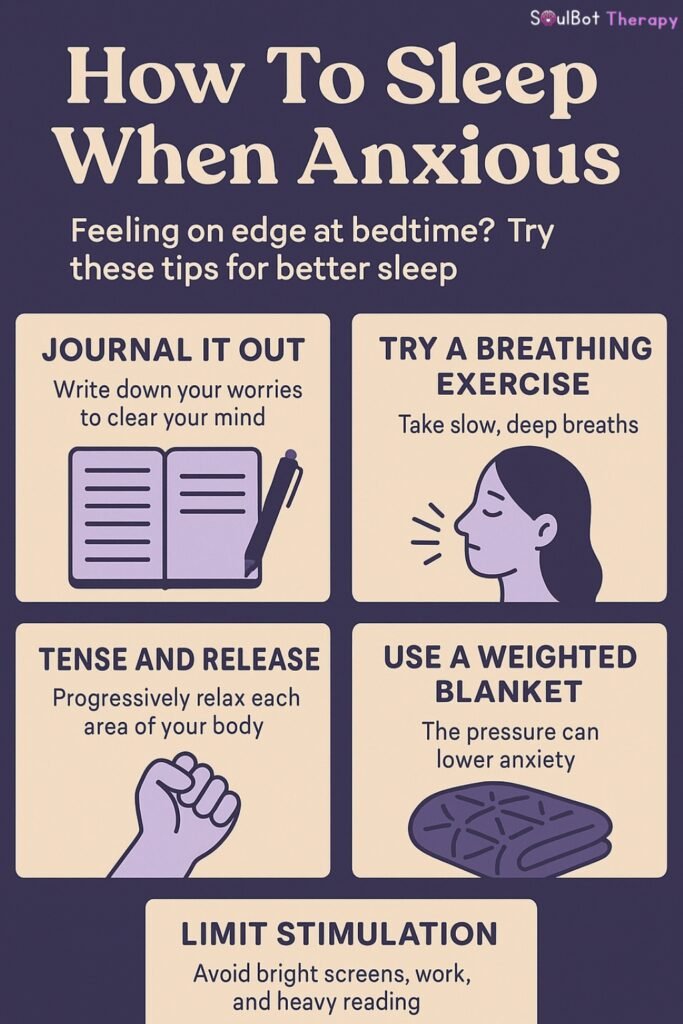Night overthinking remedy is important for today’s generation because when your brain won’t stop. And you feel tired, but it’s like your mind missed the memo.
That’s where a solid night overthinking remedy matters, not another wellness cliché, but something that actually works when your thoughts won’t quit at 2 a.m.
This blog isn’t about telling you to “just relax.” It’s about practical tools, science-backed methods, and mental health strategies that help shut off the brain-loop spiral at night and reclaim your sleep.
Why Overthinking Gets Worse at Night?
Here’s the thing: when the world gets quiet, your inner noise gets louder.
Your brain has no distractions, no to-do lists to keep it occupied. So it replays that awkward text, tomorrow’s deadline, or an entire life plan you’re too tired to build.
And if you struggle with anxiety? That loop gets even more intense. Cortisol levels (your stress hormone) can stay high into the evening, making it harder to wind down.
That’s why finding a night overthinking remedy isn’t just about sleep, it’s about calming your nervous system and building habits that make mental peace non-negotiable.
What are the Signs You’re Caught in the Night Overthinking Loop?
- You replay the same thoughts repeatedly
- You plan conversations that haven’t happened yet
- Your body is tired, but your mind feels wired
- You get anxious as bedtime approaches
- You wake up tired because your brain never truly shuts off
🧘♀️SoulFact: The Sleep Foundation confirms that screens can delay REM sleep, reduce sleep quality, and increase nighttime rumination.

What are the Night Overthinking Remedy?
1. Ground Yourself First: Calm the Body, Then the Mind
You can’t outthink overthinking.
Start by resetting your body. Do something physical and grounding:
- Splash cold water on your face (activates the vagus nerve)
- Try 4-7-8 breathing: inhale 4, hold 7, exhale 8
- Do 30 seconds of progressive muscle relaxation
- Hum or sing gently; this calms the nervous system faster than silence
These quick tools help reset your nervous system so your brain stops scanning for danger and lets you rest.
2. Ditch the Doom-Scroll: Try a Mindfulness Switch
Yes, that one reel turned into 47. Phones spike dopamine and keep your brain alert.
Try this instead:
- Candlelit journaling: brain dump for 10 minutes
- Guided sleep meditation (there are plenty of free ones)
- Box breathing + body scan
- Use AI tools like SoulBot for calming sleep prompts personalized to your stress patterns
These are not big things, but they build consistency. That’s what matters when managing mindfulness for bedtime anxiety.
🧘♀️SoulFact: According to Harvard Health, too much screen time before bed interferes with melatonin and increases anxiety and insomnia symptoms.
3. Break the Loop With a “Thought Parking Lot”
Have a notepad next to your bed. When does a thought won’t stop repeating? Write it down and say, “I’ll revisit this tomorrow.”
You don’t need to solve everything right now. This stops the brain’s need to ruminate and permits it to rest.
Real talk: this works. It’s one of the best tools to stop racing thoughts at night and reclaim focus the next day.
4. Build a Sleep-Protective Routine
If your brain associates bedtime with panic, you need to rewrite the pattern.
Try:
- 30-minute wind-down routine: lights dimmed, phone away
- Light stretching or yoga nidra
- Herbal teas (chamomile, tulsi, lemon balm)
- Low-stim books, not thrillers, not productivity
Stack these into a routine. These calming nighttime rituals provide your body the signal: “We’re safe. Let’s power down.”
5. Challenge the Narrative: Intrusive Doesn’t Mean True
Here’s a gentle reminder:
- Not every thought is a truth.
- Not every fear is a prediction.
Those intrusive thoughts before sleep, “I’ll fail,” “They hate me,” “I’m not doing enough”, are often your tired brain trying to find control in uncertainty.
Don’t fight them. Acknowledge them, label them (“oh hey, anxiety”), and let them drift like clouds.
6. Sleep + Anxiety = A Loop You Can Break
If you’re wired and tired, lying in bed hoping to sleep won’t help. Try this instead:
- Get up, sit in dim light, read a boring book
- Do breathing techniques or repeat a simple mantra
- Avoid checking the time it increases stress
- Use white noise or gentle sleep sounds
Understanding how to sleep when anxious means respecting your biology, not fighting it.
The goal isn’t to have zero thoughts at night. The goal is to build a space where thoughts can come and pass without hijacking your rest.
Final Thought: Night Overthinking Remedy
- You’re not weak because your brain runs wild at night.
- You’re probably intelligent, sensitive, and stressed.
What you need isn’t willpower. It’s a plan. And sleep that actually heals.
So the next time your thoughts won’t shut off, don’t try to fight them. Guide them. Quietly, gently, consistently and do the night overthinking remedy to overcome the stress. Or just talk to our Soulbot for better guidance.
🧠 Feel like your emotions and support needs shift under stress?
Take the Love Language Test; it helps you understand how you recharge best.








